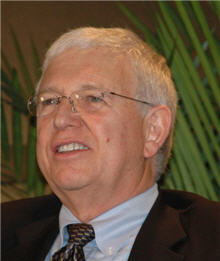CES: Big thinkers and disruptive technologies

The Consumer Electronics Show about the size of 36 football fields and exhausting, and so are the names of some of the conference sessions. I attended "Big Thinkers and Disruptive Technologies: Today's Thought Leaders and Tomorrow's Technologies," with panelists Dave Habiger, CEO of Sonic Solutions; Levy Gerzberg, CEO of Zoran; Shane Robison, executive vice president and chief strategy and technical officer at HP; Terry McBride, CEO of Nettwerk Music Group; and Owen Van Natta, chief revenue officer at Facebook. Tim Bajarin, principal analyst at Creative Strategies, moderated the session.
Each panelist offered a few disruptive technology ideas, which were predictable and clearly in support of their business strategies.

Algorithms in silicon can recognize faces, which he said could lead to enabling the blind to recognize people. Smart pacemakers with GPS could alert medical professionals to location and automatically stimulate the heart at the onset of a heart attack. People can swallow a tiny camera that transmits images via RF to a diagnostic device.
HP CTO Robison talked about a shift from device-centric to connection-centric computing. "Instead of one product that does everything, the question is how to make sure all theRobison also sees a disruption in the traditional publishing model, eliminating inventory and warehouses as on demand publishing becomes more mainstream. HP already has services for printing books on demand.
Facebook's Van Natta called the open source software movement one of the biggest disruptors. Facebook was built on a number of open source products and the social networking company contributes to various projects. Van Natta said that Facebook's founder Mark Zuckerberg only had $85 to spend per month on hosting, and if he had to pay for software he might not have started the company.
He gave the standard example of Facebook's photo applications, which he described as a "fairly inferior product" compared to the competition, lacking editing tools and other basic features. It is highly successful because it is "infused with people important to you, and you have control over who does or doesn't see your photos."
Van Natta also said that the future isn't about walled gardens. Facebook made a diplomatic move this week in joining DataPortability.org Workgroup, which is working on specifications to enable users to have their identity, photos, videos and other personal data discoverable and shared between vendors and applications. Google, Plaxo and Yahoo are also members.
There are significant design and engineering issues around data portability, which is apparently why Facebook is taking its time coming up with solutions. Users should have the right to export their "friends" from one service to another, but friends should also have a way to manage who can export their data and what data is accessible.
Terry McBride's Nettwerk Music Group produces music and manages artists, including the Barenaked Ladies and Avril Lavigne. He has some interesting ideas about further transforming the music industry, starting with getting rid of all DRM. "When music is freeBasically McBride thinks that dropping the price and eliminating locks on the content will make all parties happy. It remains to be seen if a quarter a song would compel those who don't pay to start. "You should be able to ping a song to friend or allow them purchase songs, so there should be 200 million retail stores, but the industry has to give up control," he said.
McBride has been experimenting with Barenaked Ladies, allowing fans to purchase a digital version of a concert on USB stick or online immediately after it concludes, and adding all kinds of extras. "We made about the same as selling 5 million albums last year," he said.